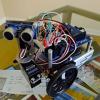Hi there,
After using the 125khz readers on the Netduino, I decided I want to write data to the tag, which forces me to use 13.56khz tags (Mifare) and appropriate reader/writers.
Initially I bought a NFC shield, which was a disaster because I couldn't get the SPI driver to work with Netduino. I've read multiple threads about it and no-one has been able to get it right with a Netduino. So I decided to get a new reader/writer using UART comms instead.
The problem is that the UART commands are all in hexadecimal format and I don't have much experience working with hex conversion into bytes to send over UART...
So a few questions before I start:
[*]If I wanted to send 0x01 as a command to search for cards, could I simply do this? serialPort.Write(Text.Encoding.UTF8.GetBytes("0x01"), 0, theLength);
[*]If I needed to encode something as hex, such as string or number (i.e "Hello World", or "12345"), how do I do this? Is there a library or method extension out there I can use to convert it?
[*]At a first glance, would this reader/writer work with the Netduino 2? I see it uses a 4-pin wire, but I can just put in some solder wire tips and connect it to the headers: http://www.elechouse...roducts_id=2156
[*]If I have 1k space on the Mifare Card, how can I calculate how much space "Helllo World" or "123456" would take in hex format on the card? I'll have a few variables i want to push into the card so I need to make sure it will all fit.
[/list]
I'd REALLY appreciate some help, it's for a project at work and I need to make sure of my facts. Thanks a ton!
















